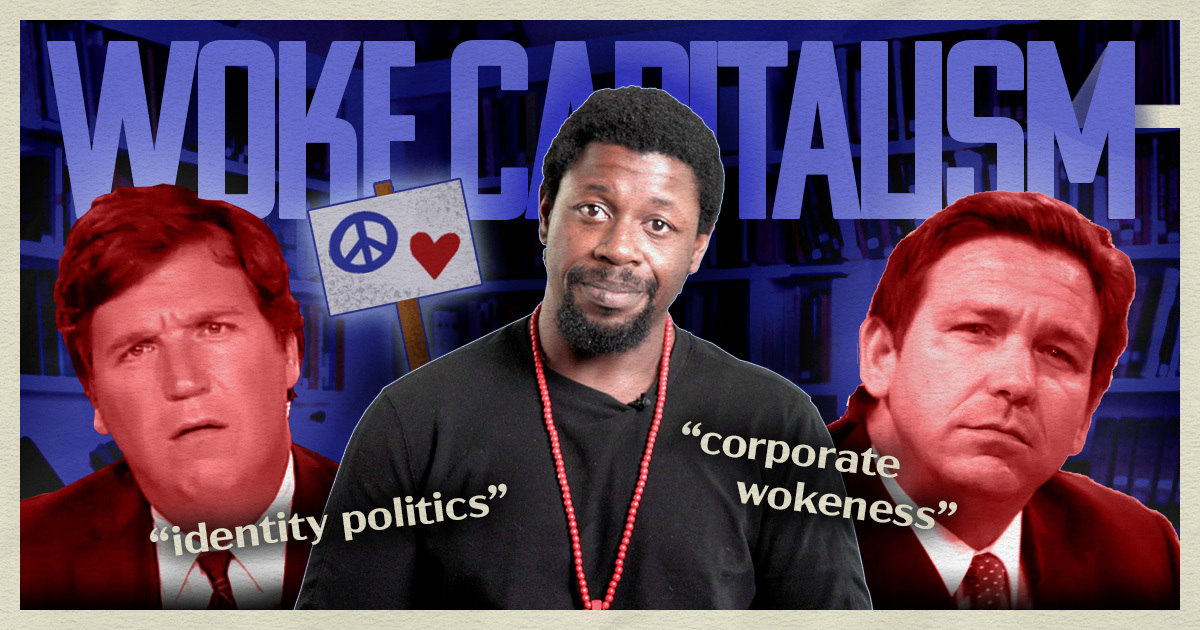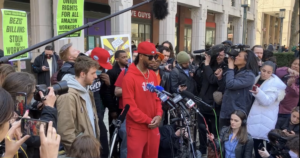Produced and Edited by Chai Dingari, Max Berger, and Brooke Shuman
The Republican war on “woke capital” is just a distraction from the real problem of corporate power. Elites captured identity politics the same way they captured our economy. Now they’re using “wokeness” to defend their wealth and power. Olúfẹ́mi Táíwò explains the full issue. Below is a full transcript of the video.
Olúfẹ́mi Táíwò: In the last few years, Republicans have been increasingly concerned about a “woke” corporate agenda.
[News clip of Tucker Carlson]: We live, as you may have noticed, in the age of “woke capital.”
[News clip]: Woke capitalism.
Olúfẹ́mi: They’re so close but…they’re missing the real problem. It’s not that corporations and establishment politicians care too much about racial or gender justice. The problem is they pretend to care about racism or misogyny to defend their wealth and power. And that’s what we should be worried about: The amount of power that corporate elites have over working people. No matter who appears on a company website or how many donations they make to charities, nothing materially changes for working people when a corporation pretends to be “woke”. But none of that hypocrisy is what bothers the far right.
[Clip of Mike Pence]: If the radical left doesn’t end its obsession with identity politics it’ll tear this country apart.
Olúfẹ́mi: The right-wing opposes “woke capital” because they see social justice as a thorn in the side of the big business that funds them. But even establishment politicians use ‘woke’ language to defend their corporate backers.
[Clip of Hillary Clinton]: If we broke up the big banks tomorrow, would that end racism? Would that end sexism? Would that end discrimination against the LGBTQ community?
Olúfẹ́mi: So how can working people actually fight back against corporations and establishment politicians who co-opt social movement language? Can “identity politics” be salvaged from corporate America and their political allies?
I’m Olufemi Taiwo, author of the book Elite Capture. And this is The Class Room, from More Perfect Union.
First off, I want to explain what I mean by identity politics, a term which is often misused.
[News clip]: Identity politics is not about solutions. It’s about undoing civilization and especially capitalism in America.
Olúfẹ́mi: It was originally coined by Black feminists in the ‘70s; they’d been shut out of the Black power movement and the women’s liberation movement. They wanted to fully participate in both, and political life more broadly. Dr. Keeanga-Yamahtta Taylor at Princeton explained: “One could not expect Black women to be wholly active in political movements that neither represented nor advanced their interests.”
Identity politics were essential as entry points for Black women to engage in politics. In modern political jargon, identity politics are often referred to as an antithesis or distraction from class struggle.
[News clip]: And they’ve made a decision to no longer try to have class warfare, but racial warfare.
Olúfẹ́mi: But the Combahee River Collective, who created the term “identity politics,” were socialists who believed recognition of people’s needs based on different identities was part of cultivating more power for the working class. The whole point was that their identities and their class position was intertwined.
The needs of oppressed communities aren’t obstacles in the fight for worker power: they’re ways to build solidarity which begets more power. Like the 1980s Lesbians and Gays Support Miners movement, where a group of queer Britons rallied together for miner labor rights. In the 1930s through the 1960s, labor unions were some of the most powerful voices against racial segregation. As solidarity increased between working people across race, movements for workers rights, women’s rights, gay rights, and civil rights won big victories.
In response, conservatives launched new efforts to destroy the solidarity of the working class. The ‘right to work’ movement–a collection of laws helping companies destroy unions–was started by Vance Muse, a Texas businessman in the early 20th century. Muse said of unionization: “From now on, white women and white men will be forced into organizations with Black African apes whom they will have to call ‘brother’ or lose their jobs.”
But today, the wealthy and powerful use the term “identity politics” to mean anything they consider too Black, or queer, or feminine for their tastes.
[Clip of Marjorie Taylor Greene]: Identity politics.
[News clip of Charlie Kirk]: Tribal racial identity politics.
[News clip]: The neverending stream of identity politics.
Olúfẹ́mi: So how did a form of politics created by Black radical feminist socialists become a favorite of Pepsi and Starbucks? The answer is Elite Capture.
In most societies, there are “elites” who have advantages over other people in some specific area of life: who have more land, resources, or skill at something than the people around them.
But how much control over how we work, where we live, or even how we talk can elites get by some more narrow kind of advantage? That depends on how unequal things are: how big the inequality is between elites and non-elites, and how effective non-elites can be in demanding fairness across different aspects of social life. The elite few redirect resources and institutions that should serve the many toward their own interests. What was once all of ours becomes theirs.
That’s the norm in hierarchical societies. Elites “capture” identity politics for largely the same reasons and in the same ways they capture everything else: from natural resources to government subsidies to labor.
The CEO of J.P. Morgan Chase took a knee at a bank branch without addressing systemic problems of capital and loan access or investments in companies that benefit from racial inequality. Washington D.C. opened “Black Lives Matter Plaza” while the district’s police were shooting Black residents, harassing protesters, and violently enforcing the racial status quo. Every Pride Month, major corporations and even the military post messages claiming to care about the LGBTQ+ community.
Corporations captured identity politics because they saw how valuable it is. They understand it changed how people felt about themselves and each other, so they found a way to make it work for them.
Imagine our society as a House: it’s got a number of rooms in it. But some of those rooms are only accessible to certain people based on their race, class, or other factors. There are plenty of rooms of power like this in our real society. I’m sitting in this room across from you because of my background: my race, my class, my family history. And you’re sitting there watching this video because of yours. This may not be the nicest room in the world, but it’s nicer than some others.
At the top of the house is the nicest room. Resources from the rest of the rooms flow there because of how the house is built. There, elite members of the house make decisions on how the house is run. The elites in this room might feel pressure from the people in the other rooms to at least acknowledge that the way things are being run is…unfair and unequal.
The Elites don’t want to lose wealth and power, but they want to appear like they’re recognizing the humanity of the people in the other rooms. To stay on top without giving up anything, they take the language of identity politics. They recognize other people in the room who represent marginalized demographics. They don’t change the structure of the house, they just change who appears in the nicest rooms.
They might even pass the mic to those people. They might choose to “take up less space” or “center the most marginalized.” It’s easy for the elite: just make it seem like they are elevating new voices, or creating space for people who were previously denied it.
I call that “deference politics,” because it’s based on asking us to defer to others in the room who come from more marginalized identities and to believe the act of listening to the people who represent those communities in the room is the solution.
Lifting up marginalized voices and making space for others can be a useful step. But, deferring to more marginalized voices within rooms of power on its own does nothing for all of those other people in the house, who will never access wealth or power.
And sometimes, claiming to care about marginalized voices can be a way to maintain wealth and power for the elite. Listen to this clip from an internal REI podcast:
[Audio from REI podcast]: Hi, REI. My name is Wilma Wallace, and I serve as your chief diversity and social impact officer. I use she/her pronouns and am speaking to you today from the traditional lands of the Ohlone people.
Olúfẹ́mi: The same podcast then goes on to implore employees not to unionize.
[Audio from REI podcast]: One of the top questions that must be on people’s minds is why REI doesn’t think unionization is the right thing for the co-op or for the employees.
Olúfẹ́mi: They use progressive language to union bust. Starbucks made a PR push for their program expanding healthcare benefits for trans employees in 2018, then threatened to take those benefits away during the current union push. Amazon even used charities meant to support Black business owners to argue against antitrust laws that would support small businesses.
If we really want to change how life works for working people and others towards the bottom of the social structure, we can’t just focus on matters of representation and who is speaking. We need new rooms – and a new blueprint for the house that they’re in.
Yes, it is valuable for individuals to learn how to understand their privilege and to organize with others who share our identities. But forms of deference politics that ask identity-privileged people to take up less space and feel bad about themselves will never threaten the global financial and political elite who control our society.
Instead of identity politics which can easily be co-opted by corporate America, we need to work together for constructive politics focusing on positive outcomes for working people. To get there, we can start with identity, but however we start, we have to arrive at solidarity. We need to recognize the ways we are different, yes. But to actually challenge the elites who dominate wealth and power in our society, the working class also needs to connect through our similarities: that’s solidarity.
Solidarity recognizes our mutual interests and shared humanity, and identifies our shared adversaries. It’s about accepting that our fates are intertwined, instead of allowing those in power to exploit our differences to divide us. Solidarity is a key principle for successful labor union organizing.
[Clip of Amazon worker, Minnesota]: You know it takes a whole freakin’ village to win. You know, one voice is not gonna count.
[Clip of Chris Smalls, president of the Amazon Labor Union]: We want to represent all people. We want to make sure that it’s all inclusive; and putting workers in the driver’s seat, that’s the ultimate power.
[Clip of Mark Ashton, Gays and Lesbians support the Miners]: It’s qulte illogical to actually say ‘Well I’m gay and I’m meant to defend the gay community but I don’t care about anything else.’ It’s ludicrous. It’s important that if you’re defending communities that you also defend all communities and not just one.
Olúfẹ́mi: Solidarity unites working people against the corporate elite and isn’t satisfied with symbolic victories or the mere appearance of justice. Solidarity fights until a more equitable distribution of wealth and power has been won. But we can’t achieve true solidarity until we identify and acknowledge what is really dividing us: far-right media, establishment politicians, and big corporations united in the cause of capturing more power and wealth for the elite.
As Dorian Warren says, “The goal is not a rainbow oligarchy, but a truly equitable multiracial democracy.” Once we collectively realize who is trying to divide us, we can work towards solidarity and real economic justice for everyone—not just the symbolic identity politics facade created by the ultra-wealthy.
Videography by Justin Feltman



